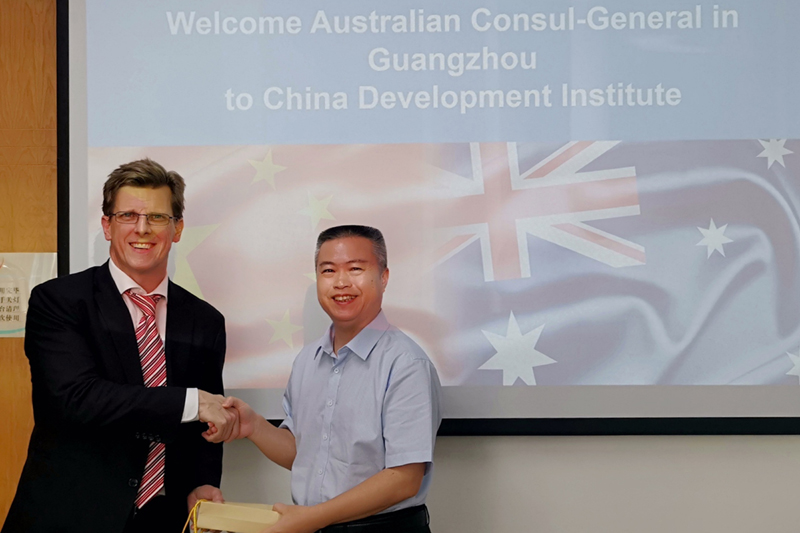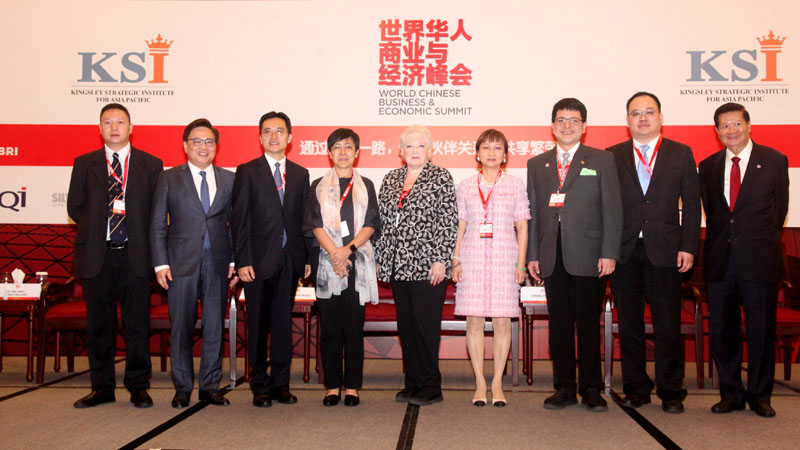
2019 - News
The 2019 World Chinese Business and Economic Summit, co-organized by CDI, was held in Macao on October 17. Discussion surrounded better ways to connect within the GBA, for example free flow of talents among the different jurisdictions, e-payment system that services the different currencies, air transportation between the rivers etc.Dr. Wang Wanli, Executive Director of Hong Kong, Macao and Reginal Development Research Department of CDI, spoke on Shenzhen’s role in Guangdong-Hong Kong-Macao Greater Bay Area development.

On October 10, US congressmen assistant delegation visited CDI. Discussion surrounded the current state of Shenzhen’s economic and social development. CDI researchers introduced the brief history of Shenzhen’s development, as well as the essential element for its fast growth – market economy. Now, Shenzhen also stresses on government service refinement, low carbon development, intellectual property protection, and vocational and technical education program etc.


On September 19, Mr. Christopher Christian and the Federated States of Micronesia delegation visited CDI. Meeting focused on current state and vision of Micronesian tourism industry development, as well as collaborations opportunities between China and Micronesia. Based on strong emphasis on sustainable development, future collaborations in tourism industry should be gradual and paced. With ambitious goals in mind, Mr. Christian expressed intentions to start small in the foreseeable future, for example with adding Shenzhen and Pohnpei airway as pilot project.

On September 4, New Zealand Consul-General Delegation, led by Rebekah Mawson, New Zealand Consul-General in Guangzhou and Paul Hawkes, the Deputy Consul General, visited CDI and discussed China-US trade conflict and Guangdong-Hong Kong-Macao Greater Bay Area with CDI experts. Both sides had a proactive discussion on the current situation of China's economic development under the trade war between China and US, the investment in the Guangdong-Hong Kong-Macao Greater Bay Area from home and abroad and the Hong Kong’s role in the Greater Bay Area development.

On August 28, Prof. Fan Gang, President of China Development Institute, met with Reserve Bank of Australia delegation led by governor Dr Philip Lowe. Discussion surrounded China’s economic development outlook, Sino-US trade war and its implication on exchange rate, current state of cryptocurrency development, and Hong Kong’s prospect within Guangdong-Hong Kong-Macao Greater Bay Area.

On August 26, Prof. Jonathan Liebenau of London School of Economics and Political Science, Dr. Gul Berna Ozcan of Royal Holloway University of London visited CDI. Dr. Cao Zhongxiong, Executive Director of New Economy Research Institute of CDI, introduced the history of Shenzhen’s high-tech innovation, how it came to the current stage, and its strengths and weakness, especially the lack of top research universities and institutes. He pointed out that Shenzhen has a long way ahead.

On July 30, Jason Robertson, Consulate General of Australia in Guangzhou visited CDI. CDI experts, led by Dr. Guo Wanda, Executive Vice President attended the meeting. Discussion surrounded the development of Guangdong-Hong Kong-Macao Greater Bay Area. Both sides exchanges views on quo status of foreign direct investment and issues concerning the business disputes between foreign and domestic companies in China’s Greater Bay Area. CDI experts also shared current condition of science and technology commercialization and industrialization in Shenzhen Special Economic Zone.


On July 19, Young Indians Global Excellence Mission to China delegation visited CDI. Discussion focused on the Guangdong-Hong Kong-Macao Greater Bay Area (Greater Bay Area) outline and economic development of Shenzhen throughout reform and opening-up with CDI experts.
Dr. Guo Wanda, Executive Vice President of CDI, introduced the Greater Bay Area outline in terms of development challenges and working priorities such as infrastructure connectivity, industrial clusters, and institutional innovation. CDI expert also answered questions on comparison study of India and China’s bio-pharmaceutical development.

On June 28, Peter Vanham, lead writer and US Media Lead of World Economic Forum, interviewed Dr. Liu Guohong and Dr. Liu Yu of CDI. Discussion surrounded Shenzhen Special Economic Zone’s success, its construct, and replicatory value for other developing countries, and the relationship between global climate change and world economic growth. Stable political and social environment is crucial prerequisite for the development of SEZ, said Dr. Liu Guohong. In terms of the ongoing struggle to balance reducing carbon footprint and maintaining economic growth, Dr. Liu Yu believes that climate change does not necessarily restrict economic growth. On the contrary, new business opportunities have risen along new energy and related industries, as seen in electric cars manufacturing.


On June 27, HSBC delegation led by Mr. Steward James, Head of Group Public Affairs, Asia-Pacific, visited CDI. Discussion surrounded important aspects of Guangdong-Hong Kong-Macao Greater Bay Area, such as free movement of talents, research equipment and capital etc., as well as further opening up towards Hong Kong and Macao free ports. Hong Kong serves as a platform for both “going-out” of mainland enterprises, which is crucial for BRI related projects, and international players coming into mainland China, which also contributes to prosperity of GBA, said Dr. Guo Wanda, Executive Vice President of CDI. During the meeting, he also suggested that in case of Brexit, UK’s cooperation mechanism with EU members, such as Ireland, will be most valuable example for the development of GBA, especially in terms of economic, trade and cross border exchange. In terms of recent issues seen in projects along BRI countries, China is working strongly towards increasing transparency and financial diversity to reduce barrier for multilateral development banks and international enterprises to partake in BRI projects.
More...
 On June 4, United States media delegation visited CDI, with journalists from various major media outlets, such as Quartz, Reuters, Forbes, Bloomberg, National Public Radio, and Austin Business Journal. Vice President Qu Jian introduced the layout and development goals of the Guangdong-Hong Kong-Macao Greater Bay Area. The discussion focused on each city’s role and its comparative advantages within the Greater Bay Area.
On June 4, United States media delegation visited CDI, with journalists from various major media outlets, such as Quartz, Reuters, Forbes, Bloomberg, National Public Radio, and Austin Business Journal. Vice President Qu Jian introduced the layout and development goals of the Guangdong-Hong Kong-Macao Greater Bay Area. The discussion focused on each city’s role and its comparative advantages within the Greater Bay Area.
 CDI research team visited North Korea for field studies on the Nampo Bonded Zone from May 20 to 24.
CDI research team visited North Korea for field studies on the Nampo Bonded Zone from May 20 to 24.
In the meeting with the Korea Economic Development Association, it was pointed out by CDI experts that North Korea, on promising trajectories of urbanization and industrialization, can move into some industries which are shifting base from China to other countries, with its abundant natural resources, cheap labor, and strong domestic demand.
 On May 20, Gyeonggi Research Institute Delegation visited CDI. Discussion surrounded the development of Shenzhen Special Economic Zone, Shenzhen’s transformation in terms of society, economy, and regulations, as well as Shenzhen and Hong Kong’s relation and cooperation throughout the years. Dr. Lee Jung Hoon proposed the vision of cross-border special economic zone between South and North Korea and Shenzhen’s successful experience should shed light on the planning and development of the special economic zone.
On May 20, Gyeonggi Research Institute Delegation visited CDI. Discussion surrounded the development of Shenzhen Special Economic Zone, Shenzhen’s transformation in terms of society, economy, and regulations, as well as Shenzhen and Hong Kong’s relation and cooperation throughout the years. Dr. Lee Jung Hoon proposed the vision of cross-border special economic zone between South and North Korea and Shenzhen’s successful experience should shed light on the planning and development of the special economic zone.
 On May 10, Consulate General of New Zealand in Guangzhou Delegation visited CDI and discussed the development of Guangdong-Hong Kong-Macao Greater Bay Area. CDI experts, led by Dr. Guo Wanda, Executive Vice President, explained geographical construct, intercity cooperation and vision of the Greater Bay Area, as well as its supportive role in Belt and Road Initiative.
On May 10, Consulate General of New Zealand in Guangzhou Delegation visited CDI and discussed the development of Guangdong-Hong Kong-Macao Greater Bay Area. CDI experts, led by Dr. Guo Wanda, Executive Vice President, explained geographical construct, intercity cooperation and vision of the Greater Bay Area, as well as its supportive role in Belt and Road Initiative.









